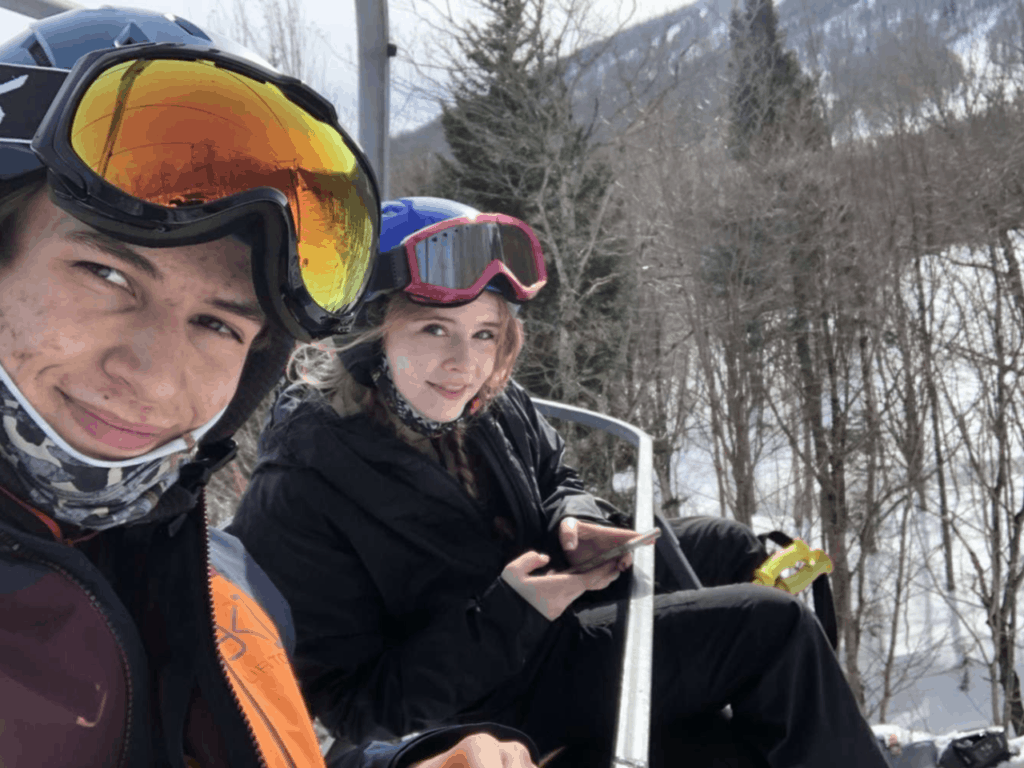
Jacob Hillman and Elena Spencer take a selfie on the chairlift at Bolton Valley Ski Resort.
By Gloria Kigonya, of Colchester High School, and Kiran Bleakney-Eastman, of Burlington High School
Editor’s note: the following article was produced as part of VTDigger’s Underground Workshop.
Before the pandemic, Burlington High School junior Rose Lowry was a social butterfly.
She loved meeting new people and creating long-lasting relationships. Quality time with her romantic partners included long car rides to thrift stores in Stowe and waterfalls in Bristol.
Now it’s one year into the Covid-19 pandemic, and Rose has been through three break-ups.
The pandemic has forced Rose, like many teenagers, to make difficult decisions, choosing between teen romance or protecting the health of their community. Couples are navigating these hard choices, balancing their needs with their families’ rules around Covid.
Rose’s family wears masks and practices social distancing. After new Covid guidelines on households were implemented in November of last year, Rose could only see friends outside. Her parents decided that her boyfriend was an exception.
It was up to Rose to choose if the quality time was worth it, and if her partner was trustworthy enough to be exposed to her family.
After making the difficult decision to bring her boyfriend home, she was finally able to feel a sense of normalcy in her relationship.
Rose says she needs quality time to be truly intimate with someone. Now that she and her boyfriend were able to spend time together inside, they could finally watercolor and dance to music in her room like they used to.
Later she realized that the limited time together still wasn’t enough, and the relationship came to an end.
“My love language is spending time with people,” she said. “And when you can’t do that, it just takes away the entire relationship.”
Covid-19 pushes people physically apart. To adapt, teens have been using FaceTime and text messages to stay connected to their significant other. For many this is not enough.
Isabella Basille is a high school junior who was in a relationship before and during the pandemic. Her relationship fell apart due to the growing distance caused by Covid.
Isabella says it was due to a lack of communication through technology and a lack of effort to see each other while following guidelines. After months of time apart, they eventually broke up.
Isolation during the pandemic has worsened teenagers’ mental health. Isabella says this was hard on her and her partner. Their bike rides and picnics together turned into hour-long video calls many miles apart.
They started calling each other less and less. She says this made it more difficult to maintain a healthy relationship.
Isabella was saddened by her breakup and learned a hard truth about dating. “If only one person tries,” she said, “then it’s not going to work out.”
But while many couples grew apart due to isolation, other couples who decided to ‘bubble’ grew even closer.
Also known as “social pods,” the term bubbling is used to describe a small network of trusted friends or relatives who agree to abide by a shared set of rules.
Although sharing a household with your partner may sound exciting, bubbling comes with an increased level of intimacy.
Elena Spencer and Jacob Hillman are high school juniors who have been dating for two years. Their parents are supportive of them staying in close contact, and the couple uses the weekends to catch up after long weeks of schooling.
Before the pandemic, they would catch up after school. “On Fridays, we would usually just take the bus downtown,” Jacob said, “and then get coffee at Muddy Waters.” Their new staple is sleepovers every weekend.
Jacob and Elena have become a part of each other’s home lives. Elena feels like she is learning more about Jacob. “We’ve gotten to know how we exist,” she said, “when we’re at our houses and just comfortable with our families.”
They are grateful to learn more about each other’s families. Jacob says if it weren’t for the pandemic he wouldn’t have learned about that side of her life until later on.
The couple acknowledges that the decisions they’ve had to make to stay together have been difficult.
“I feel like I definitely have experienced a much more mature relationship than I was expecting to, as my first relationship,” Elena said.
Could this new age of intimacy and romance change the future of dating? For some, the pandemic has put their love life on hold, while other couples experienced a relationship that they wouldn’t have had until adulthood.
With a safer future on the horizon, teenagers like Rose Lowry are ready to meet new people and create deeper romantic relationships.
“It’s hard to keep a relationship alive when you can’t have date nights or go out and do things with friends,” she said, “and I’m just excited for things to go back to normal.”




